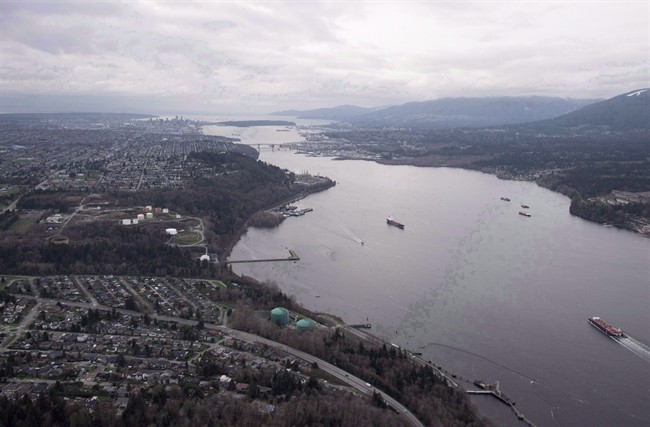A revenue-sharing agreement that helped convince British Columbia to support the $6.8 billion Trans Mountain oil pipeline expansion threatens to tear the fabric of country, says a resource policy expert.

The agreement with Kinder Morgan gives the province as much as $1 billion over 20 years. The financial benefit for the province was the last of five conditions needed for Premier Christy Clark established to approve the expansion of the pipeline through B.C.
READ MORE: Trans Mountain pipeline expansion approved by B.C. government
Watch below: On Jan. 11, 2017, B.C. Premier Christy Clark announced that her government had issued an environmental assessment certificate for the Trans Mountain pipeline expansion project.

During last week’s announcement, Clark called the agreement unprecedented because it recognized the environmental risks of locating the pipeline in B.C.
A spokeswoman for the pipeline’s builder Kinder Morgan said Monday the mutual agreement gives the company the assurance it needs.
Clark acknowledged the pipeline approval was a federal government decision, but said it was her job to protect B.C. and ensure the province received benefits from the project.
But Trevor McLeod at Calgary’s Canada West Foundation said the agreement could make Canada less competitive and set off feuds between provinces.
“My concern is with the long-term viability of the country,” said McLeod, in a telephone interview from Calgary about the B.C. deal.
He said the Western provinces joined Confederation on the promise of a railway ensuring the free movement of goods across Canada, but the Kinder Morgan agreement stretches that long-held pledge.
READ MORE: Notley applauds B.C. approval of Trans Mountain project, blasts Fonda for anti-oilsands comments
“I think it goes against the principles upon which the country was built,” McLeod said. “I think it would probably be an exaggeration to say $25 million or $50 million a year for 20 years is going to kill the country. But if this becomes the way of the future … and we get into tit for tat situations, then that would definitely do that.”
Others don’t view the B.C. deal as a country breaker, but suggest it represents a future trend in government and corporate relations.
“I think we are getting into a era of a lot more political horse-trading on different policy issues,” said Prof. Jennifer Winter, at the University of Calgary’s school of public policy.
“Look at what (Alberta Premier) Rachel Notley said when (Prime Minister) Justin Trudeau announced the federal carbon tax, in that Alberta wasn’t going to co-operate unless we got a pipeline.”
READ MORE: Rachel Notley says support for Trudeau carbon plan requires feds to act on pipelines
Watch below: In October 2016, Alberta Premier Rachel Notley told Global’s Tom Clark that unless economic conditions improved, she had an issue with the federal government’s plan to tax carbon at $50 a tonne by 2022.

Winter said it is not unique to see developers provide financial support for local projects, but the B.C.-Kinder Morgan agreement is new ground because it’s a deal between a province and a company.
McLeod said he now expects other provinces will want to make agreements on projects within their borders.
“I definitely see folks like Montreal Mayor (Denis) Coderre looking at this and saying, ‘OK,’ ” McLeod said. “He’s probably getting his measurements on how many kilometres Energy East traverses Quebec and comparing it to how many it traverses B.C. and trying to figure out how much he’s going to get.”
Coderre has been a vocal opponent of the proposed 4,500-kilometre Alberta to New Brunswick Energy East pipeline project.
READ MORE: Trudeau and Coderre meet, discuss Energy East pipeline
Watch below: In January 2016, Tim Sargeant filed this report after Prime Minister Justin Trudeau met with Montreal Mayor Denis Coderre to discuss a range of issues, including the decision by the Montreal Metropolitan Community to reject the Energy East pipeline.

Rich Coleman, B.C.’s natural gas development minister, did not address the national concerns about the revenue-sharing agreement, saying in a statement the deal supports the province’s objectives to protect the environment and provide benefits. The cash from the fund will go towards a provincial environmental fund.
Kinder Morgan spokeswoman Ali Hounsell said the company is aware of concerns the B.C. deal could cause ripples nationally, but believes the pipeline provides Canada-wide benefits.
“The way that it landed with this fund, that’s accessible by community groups and B.C., really ensures there’s a longer legacy and it’s basically benefiting both us, and ultimately benefits B.C. and in the bigger picture, Canada,” she said.
Kinder Morgan says on its website it has signed 18 community benefits agreements with local governments along 95 per cent of the pipeline route and reached 51 mutual benefits agreements worth more than $400 million with First Nations.
The expansion would triple the capacity of the existing oil pipeline, from near Edmonton to Burnaby, B.C., and is expected to increase tanker traffic seven-fold.

Comments